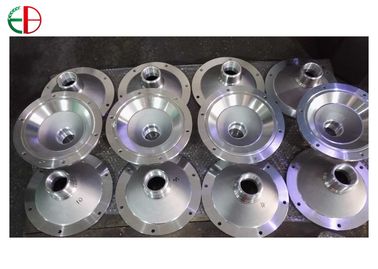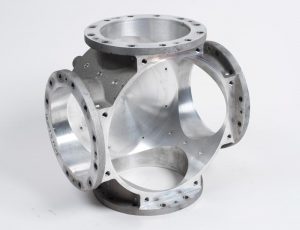How an Aluminum Casting Company ensures efficiency in every project
Exploring the Function of Factory Solutions ahead of time Modern Design Solutions
Shop services are vital fit contemporary engineering options - Precision aluminum casting. They bridge the void in between typical production methods and the demands of modern markets. With advancements in automation and sustainability, foundries are evolving to fulfill the requirements of industries such as aerospace and automotive. This makeover elevates concerns regarding the effects for materials, processes, and future innovations. What challenges and opportunities exist in advance for foundry solutions in this quickly altering landscape?
The Evolution of Shop Services in Engineering

The assimilation of computer-aided design (CAD) and simulation software application has actually transformed the style and manufacturing procedures, allowing shops to create complex geometries with higher accuracy. In addition, the change towards environmentally friendly practices has resulted in the adoption of greener innovations and reusing initiatives within foundries. As industries significantly prioritize modification and rapid prototyping, foundry solutions have broadened their abilities, ensuring they stay vital contributors to the design landscape. This evolution emphasizes the shop's critical role in sustaining developments across numerous industries, consisting of auto, aerospace, and energy.
Key Procedures and Strategies in Modern Foundries
Modern factories use a selection of vital procedures and techniques that improve the performance and quality of metal casting. Amongst these, sand spreading stays prevalent due to its versatility and cost-effectiveness. Making use of innovative innovations, such as computer-aided style (CAD) and computer-aided production (CAM), permits for exact modeling and production, making sure high precision in element dimensions. Furthermore, financial investment casting is preferred for producing complex geometries with superb surface finishes.
Automation and robotics enhance production rate and uniformity while lowering labor costs. Strategies like additive production are significantly incorporated to produce detailed mold and mildews and cores, thus reducing material waste. The application of thermal evaluation aids in enhancing spreading procedures by managing and forecasting solidification habits. Jointly, these procedures and strategies exhibit just how modern foundries are adjusting to fulfill the needs of modern engineering challenges, making sure remarkable item high quality and operational efficiency.
The Significance of Materials Choice in Shop Solutions
Picking the appropriate materials is crucial in shop services, as it directly affects the mechanical buildings, resilience, and total efficiency of the last product. Various products have special characteristics, such as tensile toughness, deterioration resistance, and thermal security, which must straighten with the desired application of the cast parts. Metals like aluminum and steel are typically chosen for their strength-to-weight proportion, while alloys can boost certain performance qualities.
Moreover, the choice process includes thinking about variables such as manufacturability, availability, and cost, which can notably influence task timelines and spending plans. Additionally, developments in material scientific research enable the development of innovative composites and specialized alloys that accommodate arising engineering difficulties. A comprehensive understanding of material residential or commercial properties and their effects is vital for engineers and foundry professionals to achieve effective results in their projects. This cautious option procedure eventually enhances the dependability and efficiency of the end products.
Foundry Providers in Aerospace and Automotive Applications
Shop solutions play an essential role in the aerospace and automotive markets, where precision and efficiency are paramount. These industries count heavily on the manufacturing of complicated parts that should fulfill strenuous high quality standards and endure extreme problems. Foundries give essential solutions such as casting, machining, and ending up, making certain elements are light-weight yet robust, important for improving fuel effectiveness and security.
In aerospace, foundry solutions add to the production of wind turbine blades, engine components, and architectural parts, every one of which need high-performance products and elaborate layouts. In the automotive field, factories provide engine blocks, framework components, and transmission situations, focusing on sturdiness and weight decrease.
Advanced shop strategies, consisting of additive manufacturing and precision casting, are increasingly used to meet the specific demands of these markets. By using customized services, factory services help drive development and maintain affordable benefits in the fast-evolving aerospace and auto landscapes.
Advancements Driven by Foundry Capabilities
Various advancements in design are fueled by the innovative capabilities of foundry services. These solutions make it possible for the production of complex geometries and high-performance materials that are essential for modern-day applications. For instance, additive manufacturing, typically known as 3D printing, has seen significant innovations through foundry techniques, permitting the quick prototyping of detailed layouts. Furthermore, the ability to cast lightweight alloys has reinvented sectors such as aerospace and vehicle, causing enhanced fuel effectiveness and performance.
Shops are progressively incorporating smart innovations, such as automation and information analytics, to enhance production performance and quality control. These developments not just minimize waste yet additionally enable modification at scale, meeting the details demands of customers. By leveraging sophisticated factory abilities, engineers can check out brand-new frontiers in item design and capability, eventually driving development throughout numerous markets and developing a aluminum casting foundation for future advancements.
Future Trends in Foundry Services and Engineering Solutions
The future of shop services is formed by emerging patterns such as lasting production methods, which focus on environmental duty. Automation and smart modern technologies are readied to enhance effectiveness and accuracy, while raising modification and versatility will certainly satisfy the progressing needs of clients. As these fads evolve, they will redefine the landscape of engineering solutions in the shop market.
Sustainable Production Practices
As industries progressively prioritize environmental responsibility, sustainable manufacturing practices within factory services are becoming necessary to contemporary engineering solutions. These methods focus on lessening waste, reducing energy consumption, and using environmentally friendly products throughout the production procedure. By executing strategies such as recycling scrap metal and optimizing melting procedures, foundries can especially reduce their carbon footprint. Furthermore, the adoption of life process analyses permits makers to assess the ecological influence of their items from inception to disposal. Teaming up with suppliers devoted to sustainability further boosts the effectiveness of these efforts. Eventually, embracing sustainable manufacturing not just lines up with global ecological objectives but likewise cultivates technology and competitiveness in the quickly progressing design landscape.
Automation and Smart Technologies
While several industries are embracing technological advancements, shop solutions are experiencing a significant improvement via automation and smart technologies. The combination of robotics and automated systems improves production efficiency, decreases human mistake, and increases the manufacturing process. Smart technologies, such as IoT and AI, enable real-time surveillance and anticipating upkeep, which optimize functional efficiency and lessen downtime. These developments assist in data-driven decision-making, enabling shops to react quickly to market demands and improve product top quality. Additionally, automation minimizes labor expenses and boosts workplace safety by taking care of harmful jobs. As factory solutions remain to adopt these advancements, they are positioned to redefine engineering remedies, leading to enhanced competition and sustainability in the production market.
Modification and Flexibility Patterns
Emerging trends in factory solutions increasingly stress customization and flexibility to satisfy one-of-a-kind consumer demands. This change reflects a more comprehensive need for customized design solutions that adjust to specific task demands and sector criteria. Companies are spending in sophisticated modern technologies, such as additive manufacturing and digital modeling, allowing them to generate personalized elements effectively and cost-effectively. Because of this, foundries are moving away from one-size-fits-all approaches, providing customers the capability to change designs and products in real-time. Furthermore, cooperation between engineering teams and foundry services is coming to be a lot more integrated, fostering technology and increasing time-to-market. This fad not just boosts product performance however likewise sustains sustainability by decreasing waste via accurate manufacturing processes.
Often Asked Concerns
What Are the Regular Expenses Associated With Shop Services?
Typical prices connected with shop solutions consist of material expenses, labor fees, equipment usage costs, and overhead costs - Precision aluminum casting. These expenditures can differ widely based upon task intricacy, quantity, and certain requirements of the engineering option involved
How much time Does the Shop Refine Generally Take?
The shop process typically takes anywhere from a number of weeks to a couple of months, relying on aspects such as intricacy, product demands, and manufacturing quantity, which can significantly influence timelines and total task distribution.
What Industries Benefit A Lot Of From Shop Services?
Industries such as automobile, aerospace, and building benefit considerably from factory services. These industries count on precision casting and metal fabrication to create intricate components, enhancing product efficiency and functional effectiveness in their respective applications.
What Accreditations Should Factories Possess?
Foundries need to have qualifications such as ISO 9001 for high quality monitoring, ISO 14001 for environmental administration, and details sector qualifications like AS9100 for aerospace or IATF 16949 for automotive, making certain conformity and quality control.
Exactly How Do Foundries Make Sure Quality Assurance in Their Procedures?

Shop solutions are crucial in forming contemporary engineering solutions. As engineering techniques have advanced, the role of shop solutions has transformed substantially to satisfy evolving market demands. As sectors increasingly prioritize modification and fast prototyping, factory services have actually increased their capacities, ensuring they continue to be vital contributors to the design landscape. As industries progressively prioritize environmental duty, sustainable production methods within factory solutions are ending up being essential to contemporary engineering services. In addition, cooperation in between design teams and factory solutions is coming to be more integrated, fostering innovation and speeding up time-to-market.